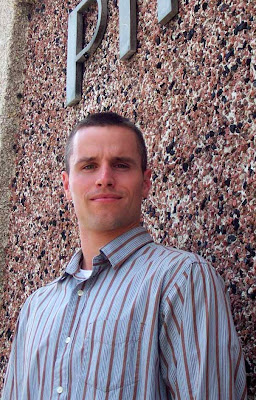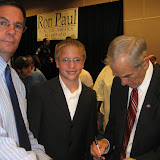by Harold Kyriazi with slight edits by the webmasterOn July 23rd, eight days before the ballot access petitioning deadline, Allegheny County LP officials were contacted by an unknown fellow wishing to run for mayor as a Libertarian, named Tony Oliva. (Older baseball fans may recognize that name as an all-star player from the 1960s and 1970s, but alas, there’s no connection.) His introductory letter to us indicated that he was naïve (27 years old, a political unknown, and imagining an upset victory), but someone with potential. He wrote that he was a military veteran, a University of Pittsburgh graduate with a degree in Political Science, a Pittsburgh resident with extensive community ties, currently employed in the city’s Office of Public Safety, and a member of the Libertarian Party.
After thus reassuring ourselves that he wasn’t crazy or mentally incompetent (for years I’ve felt badly that none of us activists here wished to embark upon that particular quixotic quest), we tried to find out more about him. Coincidentally, at the same time a co-worker of mine (who of course knows I’m a libertarian) mentioned to me that one of his former rock climbing students was running for mayor and had hit him up for a petition signature. They both happened to be paratroopers in the Army, and my coworker said he was a good guy and intelligent. It was thus nice to get some independent verification, and also to know that he was already out collecting signatures.
Within two hours of Tony emailing his letter expressing an intention to run for mayor, Tony was handed several clipboards and forms (third party nomination papers) from Allegheny County's highly energetic vice-chair, Mark Rauterkus. For months similar papers had been circulating with political body, Libertarian, and with Rauterkus occupying spots, including that of mayor, as a place-holder candidate.
That’s one of the new and exciting trends about libertarianism these days: we don’t have to go out and find people, and educate them about libertarianism – now young people find us via the internet. We don’t have to teach them much of the philosophy – they’re usually already thoroughly grounded by their readings on the web. A new day is dawning and there is hope. (Go Ron Paul!)
I corresponded by e-mail with Mr. Oliva during that final week, and despite my vow a few years ago to limit my libertarian activities, I spent a few hours collecting signatures, solicited another few from my brother. Tony and I badgered neighbors, and put some energy into the last days. “It’s harder than I thought it’d be!” expressed a few friends who turned up empty.
Mr. Oliva worked hard for sis days, collecting about 115 signatures each day and getting 700. More than 805 were needed. With his total and what everyone else collected, the Libertarians turned in plenty of signatures to clear the hurdle for the election department and challenges.
After the horrendous experience of minor parties statewide last year, I was very worried that the Republican would challenge. But for whatever reason, he didn’t. Subsequently Mark and Tony filed the necessary papers to conduct the switch of their names.
I’m happy to report that we now have three spots on the city ballot: Tony Oliva for mayor, and Mark Rauterkus for both city council and city controller.
My impression of Mr. Oliva, starting from e-mail exchanges, is clear. I can confidently state that he is a competent writer. We also spoke by phone, and then face-to-face. Based on those encounters and positive reports after a WDUQ radio interview, I can also state that he’s a competent speaker.
Some did question why the Libertarians should run someone for mayor. It is entirely possible that the Republican was already fairly libertarian and he could have a better chance of winning than we did. We could thus be hurting ourselves by splitting our vote.
Mark Rauterkus informed me on the Republican candidate, Mark DeSantis. We checked out his website. Nick spoke with someone in his office. It turns out that DeSantis is a serious candidate with typical Republican economic concerns, such as lowering taxes and increasing government efficiency, but one whose position on social issues is difficult to gauge.
We discussed the obvious -- how a libertarian mayor could instruct the city police to make consensual crimes their lowest priority, but we didn’t know Mr. Oliva’s thoughts on that score. Assuming the best, Mark Rauterkus suggested that if vote-splitting turned out to be a legitimate concern, we could always make a splash by withdrawing a few weeks before the election and asking our supporters to vote for DeSantis. That was enough to drive to do the last-minute petitioning for signatures.
Tony and I sat down to lunch last in order for me to get to know him better for this article, to discuss some of these issues, and also to give him any benefit of my political experience.
Mr. Oliva is a handsome, athletic-looking young man, with the attentive and easy, straight-forward manner that seems appropriate for someone with military experience. He still serves with the Pennsylvania National Guard.
Interesting to me as a former diehard Pitt football fan, Tony came to Pittsburgh from New York City (the Bronx) on a football scholarship from Pitt’s legendary coach Johnny Majors. Fortunately, he left any New York accent behind. In fact, Tony was Majors’ last recruit at Pitt, being recruited in 1996, shortly before Majors was fired. Oliva started at Pitt in 1997 under new head coach Walt Harris, as a 175-pound defensive back with 4.4 speed in the 40-yard dash. That’s considered a fast time. He was red-shirted his freshman year, and expected to bulk up.
In the off-season, unfortunately, while crossing the street he got hit by a car, and received career-ending damage to a knee. Being the thoughtful, independent-minded young man that he is, he refused surgery that he felt might predispose him to premature arthritis, and opted instead for rehab and more natural, alternative medical approaches.
He stayed on at Pitt, getting a degree in Political Science, and rehabilitated his knee enough to play Ultimate Frisbee for the Pitt men’s team, making nationals for three years.
After graduating, he joined the military. As a paratrooper, he suffered another severe injury, being accidentally “sharked” by a fellow jumper. That’s where another jumper cuts under you as you’re approaching the ground, taking away your air and collapsing your chute, whereupon you fall rapidly, as though a shark has just attacked and pulled you under the water. That fall resulted in a severe shoulder dislocation and accompanying nerve trauma, and left him unable to raise his left arm above shoulder level.
He’s still able to enjoy tennis and other sports, though, and comes from a very athletic family. His brother played football and baseball in college, and his sister was a standout basketball and softball player in high school. His brother is also into NY politics, having been a speech writer for George Pataki, district chief of staff for a U.S. congressmen, and director of communications for a state minority leader.
Mr. Oliva is personable and has many friends here who have offered to help him in various ways with his campaign. Unfortunately perhaps, he is naïve enough to think he has a chance to defeat Luke Ravenstahl, the incumbent democrat and another 27-year-old. Ravenstahl won an election to city council before taking over as mayor when the recently elected then-mayor Bob O’Connor died last year.
Mr. Oliva may be correct in thinking he has the advantage of his libertarian philosophy and exceptional interpersonal skills, but being a political unknown, all the money in the world can’t buy him the trust of Pittsburgh voters, 80% of whom are registered Democrat.
The best he can hope for, in my view, is to run a positive, issue-oriented campaign, impress the people he interacts with, inject some libertarian solutions into the debate (and into the minds of Ravenstahl and his aides and advisors), and pave the way for a run for another race down the road.
Some will suggest that he switch parties to Democrat and starting off as a ward committeeman, rather than thinking he can leapfrog all the way into the Mayor’s office.
Libertarians can certainly win office when they live in small communities where they can personally meet all the voters, effectively negating the negative connotations of a minor party label. But people with a strong desire to actually serve in office in a large district, where they simply cannot personally contact a significant fraction of voters, need to be real, and follow the example of people like Ron Paul. The rest of us can work within the Libertarian Party to educate the electorate, and possibly level the playing field a bit by getting more people to register as Libertarians, so that eventually we’ll have a reasonable chance at winning a major city election.
The baseball Tony Oliva was the 1964 rookie of the year in the American League. Let’s try to see to it that our Tony Oliva develops into a Libertarian Party All-Star.
 If people were told that they're kids would get an advantage if a parent lost an arm -- we'd see a lot of one-arm parents in Pittsburgh. People in our city would cut off their arm and give it to their child if they knew it would help the kid.
If people were told that they're kids would get an advantage if a parent lost an arm -- we'd see a lot of one-arm parents in Pittsburgh. People in our city would cut off their arm and give it to their child if they knew it would help the kid. 








